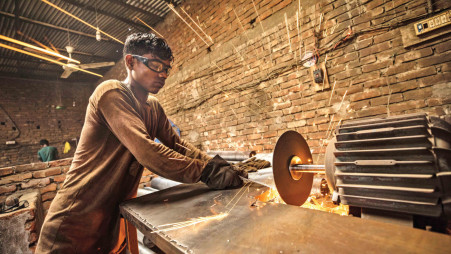Bangladesh must shift ‘from quantity to dignity’ in growth model, says German envoy
He stressed that the key question for Bangladesh is not only how fast the country is growing, but how it is growing and who is being left behind

One of Bangladesh's major challenges is transforming "an economy of quantity into an economy of dignity", said German Ambassador in Dhaka Rüdiger Lotz, warning that high growth figures alone do not guarantee improvements in people's lives.
"Although the region, particularly Bangladesh, has been experiencing very impressive growth rates, economic expansion alone does not guarantee real development for ordinary people," he said while speaking at a panel titled "From Growth to Fairness: Re-imagining Prosperity after the Great Inequality" in the last of the Bay of Bengal Conversation in Dhaka today (24 November).
At the event, organised by the Centre for Governance Studies (CGS), he cautioned that GDP growth does not automatically lift everyone. In many countries, he said, "growth increases the size of the economy but fails to improve everyday life".
He stressed that the key question for Bangladesh is not only how fast the country is growing, but how it is growing and who is being left behind.
Although the region, particularly Bangladesh, has been experiencing very impressive growth rates, economic expansion alone does not guarantee real development for ordinary people
Rüdiger Lotz, German ambassador in Dhaka
Lotz identified fairness as a strategic asset that strengthens stability and reduces volatility, adding that inequality is not a by-product of growth but an obstacle to development.
Addressing the issue of employment, he stressed that "prosperity needs agency" and requires equipping people with the skills needed to benefit from emerging economic opportunities.
He warned that the global digital transformation risks widening existing inequalities unless Bangladeshi workers gain access to relevant skills and jobs.
The envoy acknowledged that Bangladesh has benefited from globalisation and an export-open economy, but underscored that it is important to ensure export corridors do not enrich only elites.
Instead, he said the value chain must "trigger down to the whole population," which requires local production, technology transfer, investment in human capital, and stronger safety nets.
He added that people do not want to wait for long-term promises of trickle-down benefits. "People want dignity, they want to have agency, they want to be active participants," he said.
The session was moderated by CGS President Zillur Rahman. South Korean envoy Park Young-sik, Kosovo Ambassador Lulzim Pllana; Australian High Commissioner Susan Ryle, and Deputy British High Commissioner James Goldman also spoke at the session, among others.
Australian hopes for "free and participatory" elections
Reflecting on the political changes since the July 2024 uprising, Australian High Commissioner Susan Ryle said she hopes Bangladesh will hold "free and participatory elections in 2026".
She reaffirmed Australia's commitment to Bangladesh as an important partner in promoting regional stability and sustainable development.
She highlighted the strong multicultural ties between the two countries, noting that around 75,000 people of Bangladeshi heritage now live in Australia and more than 24,000 Bangladeshi students are studying there.
Ryle also outlined Australia's Indo-Pacific vision, saying all countries should be free to exercise their own agency and pursue prosperity without domination by any single power. She described the Indian Ocean as a strategic maritime region through which more than one-third of global trade passes.
Canada stresses long-term partnership
In a separate session during the conference, Canadian High Commissioner Ajit Singh underscored Canada's commitment to a long-term, principled partnership with Bangladesh.
He underscored Bangladesh's strategic importance in the Indo-Pacific, pointing to its young population, expanding manufacturing base, and influence across the Bay of Bengal.
Singh also identified opportunities in sustainable agriculture, green energy, digital technologies and responsible investment.
"Canada believes the most enduring prosperity is shared prosperity," he said, stressing the need to align development priorities with trade and local needs to promote stability and equitable growth.



 Keep updated, follow The Business Standard's Google news channel
Keep updated, follow The Business Standard's Google news channel













